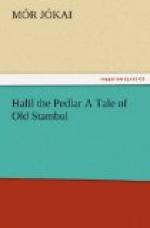[14] The prescribed almsgiving.
[15] Voluntary almsgiving.
[16] Peter the Great. The allusion is to the Peace of the Pruth.
CHAPTER XII.
HUMAN HOPES.
A time will come when the star has risen so high that it can rise no higher, and perchance learns to know that before long it must begin its inevitable descent!...
All Halil Patrona’s wildest dreams had been realised. There he stood at the very apex of sovereignty, whence the course of empires, the destiny of worlds can be controlled. Ministers of State were pulled down or lifted up at his bidding, armies were sent against foreign powers as he directed, princes were strengthened on their thrones because Halil Patrona wished it, and the great men of the empire lay in the dust at his feet.
For whole days at a time he sat reading the books of the Ottoman chroniclers, the famous Rashid and the wise Chelbizade, and after that he would pore over maps and charts and draw lines of different colours across them in all directions, and dot them with dots which he alone understood the meaning of. And those lines and dots stretched far, far away beyond the borders of the empire, right into the midst of Podolia and the Ukraine. He knew, and he only, what he meant by them.
The projects he was hatching required centuries for their fulfilment—what is the life of a mere man?
In thought he endowed the rejuvenescent Ottoman Empire with the energies of a thousand years. Once more he perceived its conquering sword winning fresh victories, and extending its dominions towards the East and the South, but especially towards the North. He saw the most powerful of nations do it homage; he saw the guardian-angels of Islam close their eyes before the blinding flashes of the triumphant swords of the sons of Osman, and hasten to record in the Book of the Future events very different from those which had been written down before.
Ah, human hopes, human hopes!—the blast blows upon them and they crumble away to nothing.
But Halil’s breast beat with a still greater joy, with a still loftier hope, when turning away from the tumult of the world, he opened the door of his private room and entered therein.
What voices are those which it does his soul good to hearken to? Why does he pause and stand listening before the curtain? What is he listening to?
It is the feeble cry of a child, a little baby child. A few days before Guel-Bejaze bore him a son, on the anniversary of the very day when he made her his wife. This child was the purest part of Halil’s joy, the loftiest star of his hopes. Whithersoever I may one day rise, he would reflect, this child shall rise with me. Whatever I shall not be able to achieve, he will accomplish. Those happier, more glorious times which I shall never be able to see, he will rejoice in. Through him I shall leave behind me in Ottoman history an eternal fame—a fame like to that of the Kueprili family, which for a whole century and a half gave heroes and saints and sages to the empire.




